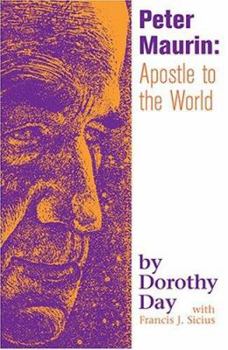Peter Maurin: Apostle to the World
Select Format
Select Condition 
Book Overview
Dorothy Day's life among the poor and her witness for peace are widely known. Those familiar with that story know the crucial role she assigned to Peter Maurin (1877-1949) the French peasant who inspired her to found the Catholic Worker. Yet Maurin's life and thinking have remained in the shadows. To convey a fuller sense of his story Day began this biography of Maurin in the 1940s but it remained unpublished--until now. Day provides the most complete...
Format:Paperback
Language:English
ISBN:1570755507
ISBN13:9781570755507
Release Date:September 2004
Publisher:Orbis Books
Length:187 Pages
Weight:0.55 lbs.
Dimensions:0.6" x 5.4" x 8.3"
Customer Reviews
1 rating
From the Catholic Historical Review
Published by Thriftbooks.com User , 14 years ago
Dorothy Day's longstanding desire to publish a biography of Peter Maurin has at last borne fruit through the work of Francis J. Sicius, who served both as editor and co-author of the present study. Dorothy had begun her Maurin biography by 1943 and completed the rough manuscript in 1947, just two years before Maurin's death. However, the work remained in need of considerable editing, a job that Day neither found the time nor energy to pursue toward publication. Thus, we owe a great debt to Sicius, who unearthed Dorothy's biography from the archives, readied it for publication, and, when necessary, filled in the gaps of Day's account by incorporating passages from her other writings, such as The Long Loneliness. For greater ease while reading the present work, Day's words are printed in italics; Sicius' narrative, which is nearly half of the book, appears in normal font. The genius of the content and structure of Peter Maurin: Apostle to the World is threefold. First, Sicius provides a type of basso continuo that is supportive of Day's narrative. His own portions of the text unify and clarity her story without overpowering it, thus carrying through on Sicius' own claim: "The true author and inspiration for this work remains Dorothy Day..." (p. xv). Second, Sicius honors Day's perspective on Peter the man and saint, whose spirituality greatly affected the development of Dorothy's own. While focusing on Maurin the person, Sicius nonetheless provides the reader with a larger historical, theological, and cultural context than the one which Dorothy was able to provide. Third, Sicius appropriately enlarges upon Maurin's intellectual heritage--which Day also remarked upon, but in more piecemeal fashion. In this area, Sicius moves beyond even Marc H. Ellis's fine study, Peter Maurin: Prophet in the Twentieth Century (1981). Sicius is the sole narrator throughout his remarkable Chapter 8, "The Green Revolution," in which he clearly distinguishes between Dorothy's vision and Maurin's own. Socitis rightly presents Maurin as a Catholic thinker who viewed the medieval synthesis as an "expression of a moral vision that could be applied to all time" (p. 124). Maurin, with his great capacity for synthesizing ideas, offered a dream for integrating matter and spirit as an alternative to the competitive capitalism that spawned the economic depression of 1929 through the 1930's. In short, Maurin outlined a plan for faith-based communities, working for subsistence, close to the land. He saw the need for humanity to live in harmony within the natural environment, as Sicius so aptly notes, "decades before intellectuals and social activists" took up the baton (p. 126)....




